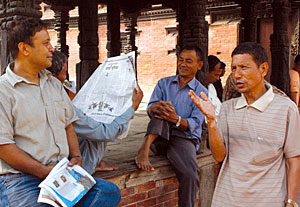 ANURAG ACHARYA |
Being a journalist in this country has its moments. You hobnob among Kathmandu's power elite, you get to see up close just how narrow their world is and how it is defined by one-upmanship.
And what a contrast it is when you then travel to Nepal's outback mired in its dusty, grimy poverty, and see the stark difference between daily lives of the rulers and the ruled.
And that is also where you experience the glaring disconnect between the obsession of capital-centric national media and the everyday concerns of rural Nepalis. This contradiction has seeped into the public consciousness.
In the oppressive heat of the Tarai summer in Lahan last week I approached an elderly man in a tea shop. "Go back to Kathmandu and talk to your netas," he told me gruffly, "don't pretend you need my opinion, as if it matters."
The people are so fed up with political posturing and slogans that they are now blaming the messengers, the media, for giving so much space to them. They also think the media is partisan, dominated by biased opinions, and driving a wedge between Nepalis instead of pulling them together.
Recently a newspaper published a list of journalists and editors who had 'sold out' to the ruling coalition partners, the Maoists and the Madhesis. The news also stated that the Nepali Congress is now preparing to 'buy' its own media house. It is hard to say which is more absurd: a newspaper printing a list of 'pro-government' editors, or the Kangresis thinking they need a media house to lift their sagging fortunes.
Indeed, editorial positions have hardened as the stakes get higher in the political vacuum left by the dissolution of the CA. Editorials and prime time news sound like smear campaigns between the rivals. The corporate media is openly taking sides depending on their business and political stakes, viewers and readers are subjected to stilted and barely-concealed propaganda.
Last week, there was a Panchayat-style warning to a tv station from the Ministry of Information (under direct orders from the PMO) for daring to broadcast news critical of the government.
But the threat to press freedom does not only stem from the state or from commercial interests beholden to politicians, eroding journalistic ethic among the messengers is equally to blame. Into this throw is a society that is now polarised by ethnicity, where a volatile mixture of hate speech, outright racism and maliced opinions are taking precedence over journalism.
It is neither realistic nor fair to expect 100 per cent objectivity from journalists. In a society divided by class, caste, ethnicity and gender, viewpoints become even more pronounced. Journalists can vote for their favourite party inside the secrecy of the polling booth and therefore needn't be apologetic about their political standpoints. The point is to be critical, give due regard to dissenting voices, play the adversarial role and balance personal bias with professional integrity. It is when journalists cross the line and start sounding like party whole timers that the media's credibility is hurt. Let that be the job of politicians who now seem to be monopolising more and more of the op-ed space in the mainstream media.
Today, the Nepali media's credibility is in question, not just from readers and viewers, but also from within. Sub-national, socio-economic issues are sidelined in favour of Kathmandu politics, often blurring the lines between information and disinformation.
Picture this: the opposition parties are on a national campaign against the ruling coalition and protest against everything they do or say. The prime minister and his coalition partners, on the other hand, blame the opposition for behaving irresponsibly. Both get media attention, but to make overall sense of what is happening the reader now has to buy a whole spectrum of newspapers to filter out the bias.
Jaya Ram Shrestha has run a sidewalk newspaper stand at the New Baneswor intersection for nearly 20 years. "They have been coming here, drinking tea and scanning the headlines," he says of the freeloaders, "but I have never seen them as disillusioned and confused as they are today."
Protracted transition and post-27 May void have taken their toll on the fourth estate, as well. The platform for debating national problems has today become a part of the problem. As the corporate media looks to secure its long-term interests by taking political positions, journalists now have even more of a responsibility to make sense of national issues, bring up the concerns of ordinary Nepalis, and help bridge the gap between the rulers and ruled.
If the media becomes an extension of the propaganda arm of political parties, it undermines both democracy and the free press.
Read also:
he assassin creed
Paradigm shrift, RUBEENA MAHATO
Media loses its political independence when it becomes unviable as a business



